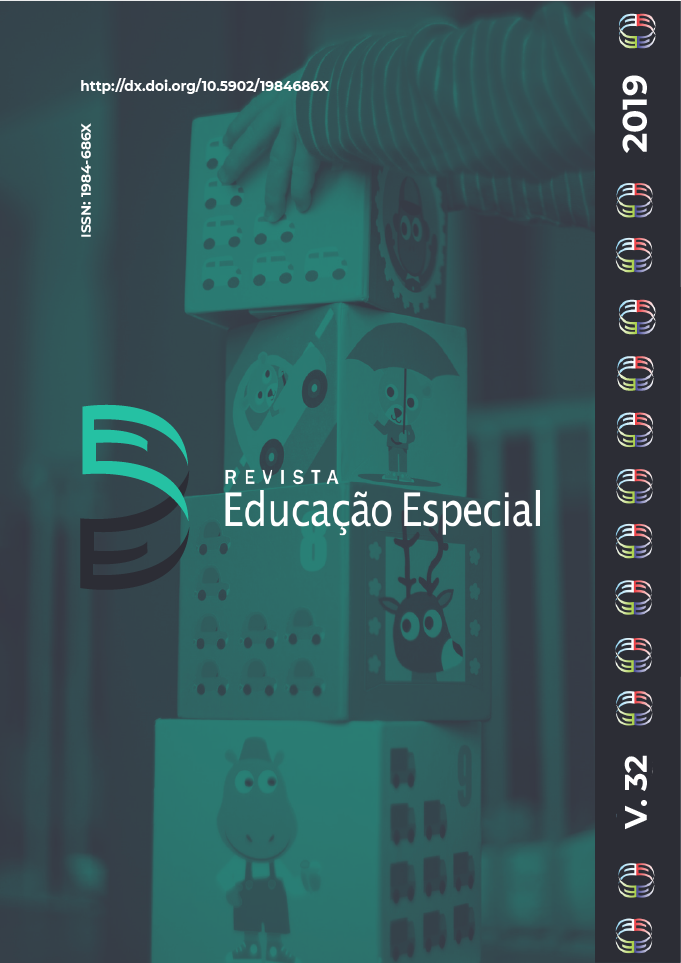Characteristics of teacher quality in the perception of students with high ability/giftedness
DOI:
https://doi.org/10.5902/1984686X35296Keywords:
Teacher training, High ability/giftedness, Inclusive education.Abstract
This paper presents a research focused on the perception of students with high ability/giftedness, regarding the characteristics of teachers that contribute to the success of the process of teaching and learning in the classroom. Thus, this study has as its general objective to contribute to the practice of teachers who work with students with high ability/giftedness. Moreover, the specific objective of this work is to investigate, according to the perception of students with high abilities/giftedness, what are the teaching characteristics that contribute to the success of their learning. 40 students with high ability/gifted from the 8th and 9th grade of Elementary School from an social institute’s project in a city in São Paulo state participated in this research. As a methodological tool for the data collection was created a questionnaire which consists of five open-ended questions. For the analysis of the responses of these participants was used the content analysis constructs by Bardin (2011). The results of this research show that, in the perception of the majority of the participating students, the main teaching characteristics that contribute to the success of their learning are related to the good didactic/good didactic work of the teacher. Although less frequently, good relationships, good sense of humor and a willingness to learn were also mentioned as quality characteristics. In addition, the characteristics obtained in the presented research are necessary to all teachers and beneficial not only to the students with high ability/giftedness but to all of them.
Downloads
References
ABUD, Maria José Milharezi. Saberes didáticos que se fazem necessários na formação de professores. In: ALVES, Cecília Pescatore; SAAS, Odair. Formação de professores e campos do conhecimento. São Paulo: Casa do Psicólogo, 2004. p. 131-154.
ALENCAR, Eunice Maria Lima Soriano de; FLEITH, Denise de Souza. Superdotados: determinantes, educação e ajustamento. 2. ed. São Paulo: EPU, 2001.
ARANTES, Valéria Amorim. Afetividade e Cognição: rompendo a dicotomia na educação. Videtur, Porto, n. 23, 2003. Disponível em: <http://www.hottopos.com/videtur23/valeria.htm>. Acesso em: 7 out. 2018.
BARDIN, Laurence. Análise de Conteúdo. Tradução de Luís Antero Reto e Augusto Pinheiro. São Paulo: Edições 70, 2011.
BRASIL. Ministério da Educação. Secretaria de Educação Especial. Política Nacional de Educação Especial na perspectiva da Educação Inclusiva. Brasília, DF: MEC/ SEESP, 2008. Disponível em: <http://portal.mec.gov.br/arquivos/pdf/politicaeducespecial.pdf>. Acesso em: 19 jun. 2016.
FELDHUSEN, John Frederic. The teacher of the gifted students. Gifted Education International, v. 3, n. 2, p. 87-93, 1985. Disponível em: <http://gei.sagepub.com/content/3/2/87.abstract>. Acesso em: 01 ago. 2016.
JUSTO, José Sterza. Humor, educação e pós-modernidade. In: ARANTES, Valéria Amorim. (Org.). Humor e alegria na educação. São Paulo: Summus, 2006. p. 103-125.
MARTINS, Alexandra da Costa Souza; ALENCAR, Eunice Soriano de. Características desejáveis em professores de alunos com altas habilidades/superdotação. Revista Educação Especial, Santa Maria, RS, v. 24, n. 39, p. 31-46, jan./abr. 2011. Disponível em: <https://periodicos.ufsm.br/educacaoespecial/article/view/1881/1714>. Acesso em: 7 out. 2018.
OUROFINO, Vanessa Terezinha Alves Tentes de; GUIMARÃES, Tânia Gonzaga. Características intelectuais, emocionais e sociais do aluno com altas habilidades/superdotação. In: FLEITH, D. S. (Org.). A construção de práticas educacionais para alunos com altas habilidades/superdotação: orientação a professores. Brasília, DF: Ministério da Educação, Secretaria de Educação Especial, 2007. v. 1, cap. 3, p. 41-51. Disponível em: <http://portal.mec.gov.br/seesp/arquivos/pdf/altashab2.pdf>. Acesso em: 01 jul. 2016.
RECH, Andréia Jaqueline Devalle; FREITAS, Soraia Napoleão. Uma análise dos mitos que envolvem os alunos com altas habilidades: a realidade de uma escola de Santa Maria/RS. Revista Brasileira de Educação Especial, Marília, v. 11, n. 2, p. 295-314, maio/ago. 2005a. Disponível em: <http://www.scielo.br/pdf/rbee/v11n2/v11n2a9.pdf>. Acesso em: 01 jun. 2015.
RECH, Andréia Jaqueline Devalle; FREITAS, Soraia Napoleão. O papel do professor junto ao aluno com Altas Habilidades. Cadernos de Educação Especial, Santa Maria, RS, n. 25, p. 1-7, 2005b. Disponível em: <http://coralx.ufsm.br/revce/ceesp/2005/01/a5.htm>. Acesso em: 23 jan. 2016.
RENZULLI, Joseph S. Will the Gifted Child Movement be Alive and Well in 1990? Gifted Children Quarterly, v. 24, n. 1, winter, 1980, p. 3-9. Disponível em: <http://gcq.sagepub.com/content/24/1/3.extract>. Acesso em: 30 abr. 2016.
VALLE-RIBEIRO, Natália do; BARBOSA, Altemir José Gonçalves. Características da produção sobre professores de alunos com dotação e talento. Psicologia da Educação. São Paulo, n. 38, p. 101-112, 2014. Disponível em: <http://revistas.pucsp.br/index.php/psicoeduca/article/view/22805/19406>. Acesso em: 07 out. 2018.
VIALLE, Wilma; TISCHLER, Kornelia. Teachers of the gifted: a comparison of students’ perpectives in Australia, Austria and the United States. Gifted Education International, v. 19, n. 2, p. 173-181, 2005. Disponível em: <http://journals.sagepub.com/doi/pdf/10.1177/026142940501900210>. Acesso em: 07 out. 2018.
Published
How to Cite
Issue
Section
License
Declaration of originality
We declare that all articles present in the journal Revista Educação Especial (UFSM) are originals and were not submitted for publishing on any other publication, as a whole or a fraction. We also declare that, after being published by Revista Educação Especial (UFSM), a paper will not be submitted to another journal within two years. After this time, our journal transfers the publishing rights to the authors, with a permit granted by the Editorial Council.
We also acknowledge that the originals’ submission to Revista Educação Especial (UFSM) implies on a transference of copyright for physical and digital publishing to the journal. In case of noncompliance, the violator will receive sanctions and penalties predicted by the Brazilian Copyright Protection Law (n. 9610, dated 19/02/98).







